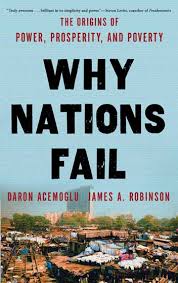The Benefits of Democracy: Learning From History
Historians tend to distrust sweeping arguments, particularly when claims include predictions. It’s an understandable caution. We are trained to work carefully, looking backwards. The tools that help a historian are not the necessarily the same skills that identify macro-trends and tendencies. But don’t avoid history because it can’t predict the future. Good histories, read collectively and critically, tell us a ton. Better still, when good history is coupled with the insights from the social sciences, very promising ideas are possible.
 Why Nations Fail: The Origins of Power, Prosperity and Poverty is thick and robust history with social science, and it is done very well. Written by economist Daron Acemoglu and political scientist James A. Robinson, the book covers centuries of growth, conflict, advance and decline. It is national histories looked at globally and comparatively. The authors draw from many continents, reading widely and critically. The authors offer ambitious thinking about world history.
Why Nations Fail: The Origins of Power, Prosperity and Poverty is thick and robust history with social science, and it is done very well. Written by economist Daron Acemoglu and political scientist James A. Robinson, the book covers centuries of growth, conflict, advance and decline. It is national histories looked at globally and comparatively. The authors draw from many continents, reading widely and critically. The authors offer ambitious thinking about world history.
Their arguments proceed in two parts. First, they look at the range of factors which shape the degree of democracy or autocracy in a nation over time. Their big picture observation is that shifts to greater democracy are often the result of threats, real or potential, by those that have money and power. Without viable threats, wealth and power tends to accumulate. Power begets power – and there is no inevitable democratic impulse. The arguments in Federalist Papers #10, in other words, bear out over the centuries.
The second half of their book examines the benefits of more of living in more democratic societies. They use an economic lens primarily, but also include research from other social sciences. They explain that the nations that support more “creative destruction” from capitalism experience greater innovation and wealth. It is an empirical argumentation, not ideological. Acemoglu and Robinson have the data and history to support their claims.
Acemoglu and Robinson’s explanations are not the only ones, of course, to explain any one historical trend. They are not searching for detailed history. They pass over contingencies, which bedevil all historical arguments. Further, their historical interpretations may not be the “best” when it comes to understanding the complexities of any one revolution, a war, or a similar historical event.
Why Nations Fail delivers is a powerful argument for democracy using history and social science. The authors identify the synergies of inclusive economic activity, which is supported by property rights and rule of law, which align with greater democratic values. The push towards equity brings with it, over time, greater wealth and prosperity for all. The benefits of living in a liberal society are broad and mutually supportive.
In contrast, extractive nations, with less free economies, often struggle recurring violence and instability as their leaders struggle for wealth and power. Many of these countries have histories as colonies and shallow democratic tendencies. Less free nations are less wealthy. Acemoglu and Robinson’s argument is captured in their title: they have a recipe for how nations fail.
It is thoughtful and thought-provoking book, a very interesting way to think about world history. Why Nations Fail would be a delight to teach, too. The benefits of democracy are more plentiful than we realize.
David Potash